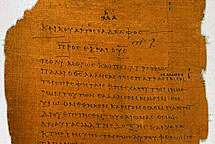

Intellectual transformations
The Roman Empire remains with us today not so much as an example of a great super-power in the past,
but because the empire itself facilitated the exchange of meaningful ideas. The creation of a common
culture that enabled a person in Britain to speak with a person from Syria was of critical
importance to the development of European culture. The ideas of classical philosophers that form
the basis of the European tradition of thought were transmitted through the Middle Ages because they
were integrated into another system of thought that was also a creation of the Roman Empire--the
Christian religion.
Jesus
was a Jew, his audience was Jewish, and he preached the reform of contemporary Judaism to his
followers. A Roman
magistrate
executed him because a Jewish crowd at Jerusalem convinced him that
Jesus was a menace to public order.
Peter and
Paul,
who preached his message to non-Jews, transformed the legacy of Jesus. Indeed, it would appear to have been largely the work of Paul that
transformed the message of Christianity into a powerful countercultural message that could appeal to
people throughout the empire who were disenchanted with the world around them.
Paul was able to succeed because he could use the idiom of Greek thought that was central to the
imperial culture of the Roman Empire. For, while the Roman Empire at no time sought to transform its
subjects the way that later European empires sought to Christianize the peoples whom they conquered,
it provided a powerful impetus to cultural conformity by rewarding those who wished to participate
in the system. A remarkably uniform system of education spread across the empire, conditioning the
attitudes of those who had the money to pay for it. Within this system, there was a very strong
emphasis on certain writers who had come to be regarded as classics, such as
Homer,
Virgil and
Plato.
In a very real sense, our own impression of classic literature, and its role in education,
was formed by that of the Roman world.
|
